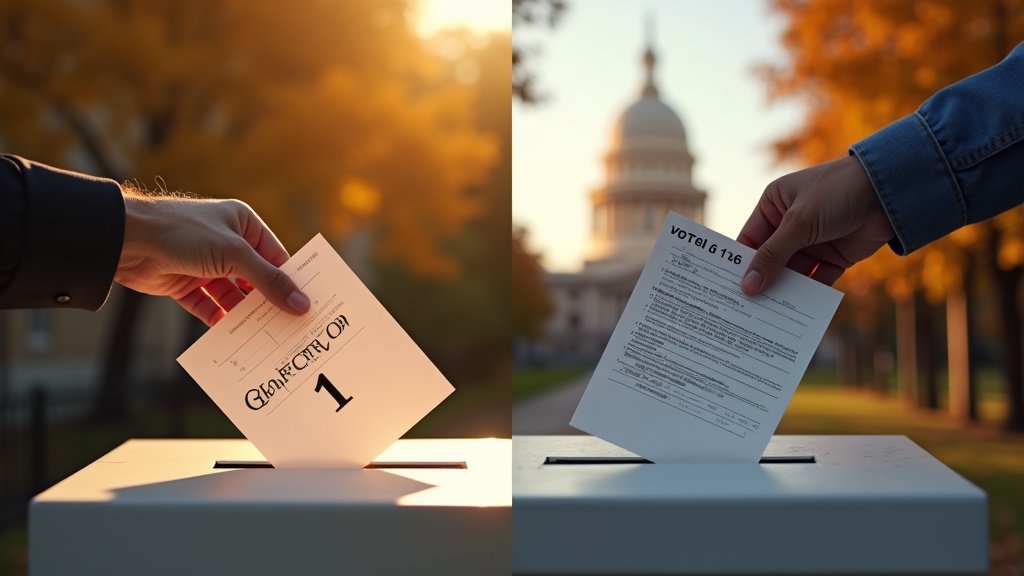Maine and Texas are on the cusp of significant shifts in their election laws as voters prepare to decide on two prominent Republican-backed ballot measures this November 4, 2025. In Maine, a broad initiative, Question 1, proposes stringent photo identification requirements and substantial changes to absentee voting procedures. Simultaneously, Texas voters will consider Proposition 16, a constitutional amendment aimed at explicitly prohibiting non-U.S. citizens from voting.
These proposals are central to the ongoing, often contentious, national debate surrounding election integrity and voter access. Supporters of these measures argue they are crucial steps to safeguard democratic processes and bolster public confidence, while opponents contend they erect unnecessary barriers for eligible voters and address issues that are rare or non-existent.
Maine Question 1: A Sweeping Election Law Overhaul
Maine’s Question 1, officially known as the “Require Voter Photo ID and Change Absentee Ballot and Drop Box Rules Initiative,” is a far-reaching citizen-led proposal that seeks to fundamentally alter several aspects of the state’s voting system. If approved, it would mandate that all voters present a government-issued photo identification to cast a ballot, whether in person or via absentee ballot. The initiative includes provisions for the state to provide free photo ID cards to those who lack them.
Beyond voter identification, Question 1 proposes significant restrictions on absentee voting, a practice that has grown in popularity in Maine. The measure would eliminate two days of early in-person absentee voting and end the automatic, ongoing absentee voter status for seniors and individuals with disabilities, requiring them to reapply for an absentee ballot for each election. Furthermore, it would prohibit voters from requesting absentee ballots by phone or through family members and ban prepaid postage on return envelopes. The number of ballot drop boxes would also be capped at one per municipality.
Supporters, including groups like “Voter ID for ME” and the conservative Dinner Table PAC, assert that these changes are vital for enhancing election security and restoring voter confidence, citing concerns about outdated voter rolls. They frame the initiative as a necessary measure to protect the integrity of Maine’s elections.
Conversely, opponents, such as the League of Women Voters of Maine and Governor Janet Mills, decry Question 1 as a form of voter suppression. They argue that the measure disproportionately impacts elderly, rural, disabled, and low-income voters, making it harder for them to participate. Critics also contend that Maine’s current election system is already secure and that the proposed changes are an unnecessary response to rare instances of fraud.
Texas Proposition 16: Constitutional Clarity on Citizenship
In Texas, Proposition 16, a legislatively referred constitutional amendment, seeks to solidify the state’s stance on noncitizen voting. The amendment’s language clarifies that “persons who are not citizens of the United States” are prohibited from voting in Texas elections. While state and federal laws already restrict voting to U.S. citizens, this measure would enshrine that prohibition directly into the Texas Constitution, making it more difficult to alter through future legislation or policy changes.
Proponents, including Governor Greg Abbott, argue that this amendment is necessary to safeguard voting rights, improve voter confidence, and provide clear enforcement guidelines. They see it as an affirmation of civic responsibility tied to citizenship and a bulwark against potential trends of noncitizen voting that have emerged in some other jurisdictions. The measure aligns with similar constitutional amendments adopted in at least 14 other states between 2018 and 2024.
However, opponents point out that cases of noncitizens voting in Texas are exceedingly rare and that existing laws already prohibit it. Critics, including organizations like the Brennan Center for Justice, argue that Proposition 16 is largely symbolic and risks misleading voters into believing that noncitizen voting is a widespread problem in Texas, where it is already illegal and carries severe penalties. The Texas Secretary of State’s office has reported finding only a small number of potential noncitizens on voter rolls amidst millions of registered voters.
A Trending National Conversation
These ballot measures in Maine and Texas are unfolding against a backdrop of intensified national discussions about election integrity, often amplified by political rhetoric. The push for stricter voter ID laws and heightened scrutiny of noncitizen voting are prominent themes within the broader Republican platform focused on election security. The contrast between these efforts and the arguments for broad ballot access highlights a trending divide in American politics, where differing priorities shape the debate over how to conduct elections.
In Maine, the proposed changes to absentee voting are particularly contentious, coming at a time when mail-in voting has become a significant part of the electoral landscape. The debate in Texas, while focused on a constitutional amendment, touches upon the state’s historical efforts to reform election laws, such as Senate Bill 1 passed in 2021, which also drew criticism for potentially hindering voter access.
As voters in both states prepare to cast their ballots, the outcomes of these propositions will reflect deeply held views on the balance between securing elections and ensuring that every eligible citizen can easily exercise their right to vote. The trending narratives around election integrity and voter suppression are set to play out significantly on November 4, 2025.






